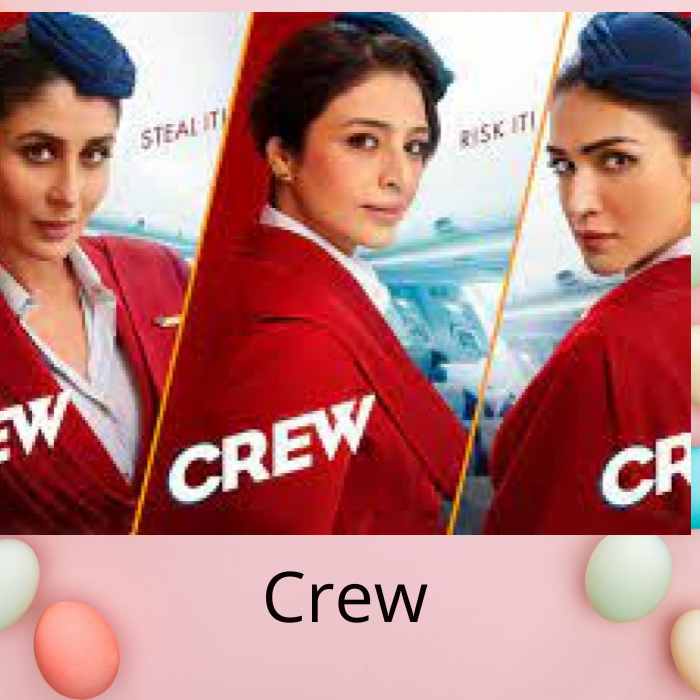Crew
Krishna’s second feature film, “Crew,” centers on three air hostesses who are fed up with mimicry and choose to mimic a high-speed jet. Rajesh’s first feature film, “Lootcase,” was an enjoyable comedy that moved along like a slow train..
Kohinoor Airlines, owned by the beautiful Vijay Valiya (Saswata Chatterjee), is deeply indebted to Geeta (Tabu), Jasmine (Kareena Kapoor Khan), and Divya (Kriti Senan). The significant threat that the women face is an imbalance between unannounced salaries, mounting bills, and expected professional equilibrium. Due to Kohinoor’s impending bankruptcy, the women would be forced into criminality.
Conscience hurts only temporarily, just like there is a lot of undocumented labor. The industrious airport inspector Mala (Trupti Khamkar) starts to get restless.
There is definitely no comparison to any other bankrupt airline that was controlled by an even more avaricious entrepreneur unable to cover employee wages. The crew makes sure that the airline’s personnel are treated fairly. Indian laborers who are paid poorly and are compelled to tidy up after their bosses’ extravagant lifestyles will persuade women to pursue an easy route to riches.
Funny enough, a disclaimer tells us that no humans or animals were hurt during the filming of this movie. The airline’s name is a comedy in and of itself, and it ends up working. “Crew” Choli Ke Peeche (2024).
The screenplay by Nidhi Mehera and Mehul Suri quickly makes an impression by highlighting the unique qualities of the girls and then showing how they work together as a team. A lively young woman, Geeta speaks up for her rights because of her age. Jasmine doesn’t mind breaking the law to satisfy her avarice, especially when that avarice is innately good. Divya’s encounters with customs inspector Jayveer (Diljit Dosanjh) reveal her secret strength.

The movie is fun, sensual, and truthful without being either sentimental or critical. A terrific group of people who are greatly relieved to be placed in roles that play to their own strengths drive the cast’s enthusiasm.
It’s fun to see Tabu, Kareena Kapoor Khan, and Kriti Senan both separately and together. Their lively connection would even convince Vijay Valiya to accept their ridiculous and hard-to-appreciate plan to give them their candies.
It’s unexpected that the movie concentrates on someone else considering the three of them together, yet they manage to pull it off. Large-scale comedies typically feature male protagonists, giving their female characters very limited screen time. In contrast, “Crew” shows that its female protagonists split the spoils evenly while reserving a little portion for their male counterparts.
Memorable walk-on parts are added by Kulbhushan Kharbanda as Jasmine’s charming grandfather, Kapil Sharma as Geeta’s loving husband Arun, and Diljit Dosanjh as Divya’s gorgeous date. The superb performance by Charu Shankar as the former servant.
The 125-minute movie has a few really captivating and satisfying scenes. “Crew” makes sure that its heroines, who are confident, astute, self-centered, and sensitive as women always are, are remembered in the haste to get where they’re going. “Crew” Evaluation: Without tying up her hair, Kareena Kapoor Khan rewinds time, lets her hair down, and observes the passing of time. The show is stolen by her. Though tasked with a highly stereotyped role, Tabu also rises above the din and chaos, bearing the brunt of the film’s weight.
Review of Saibal Chatterjee’s film Revision: 2 stars
“Crew Review: A dacoit film for providing some harmless entertainment.”
A scene from Crew in still form. (Repertoire: Courtesy)
The criminal comedy staff is best characterized as a fit-and-start case, run by a bold and avaricious staff of flight attendants. Low-yield film taxis on its assigned runway with minimal visual disruption, but once in the air it encounters a lot of bothersome turbulence and severe winds.
Let’s start with the advantages. Indeed, some people turn back time and let the world pass by without tying up their hair, such as Kareena Kapoor. The show is stolen by her. Though tasked with a highly stereotyped role, Tabu also rises above the din and chaos, bearing the brunt of the film’s weight.
Furthermore, a dacoit film has been made without any agenda, not even feminist (which would have been okay), and should be applauded for its irreverent mischief about the rich who want to rob the country and three representatives of a struggling middle class who want to repay the rich with their own money, at a time when a segment of Bollywood is busy pushing propaganda films and imposing selective history lessons on us.
